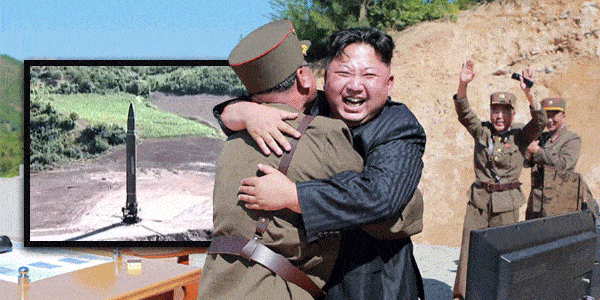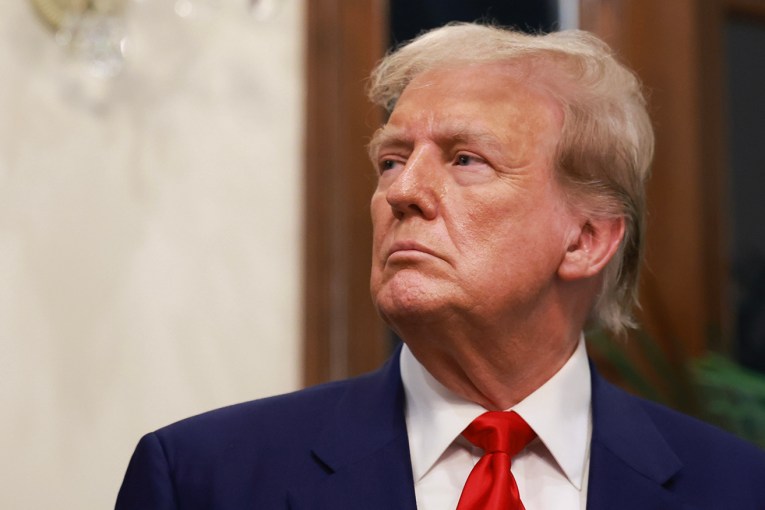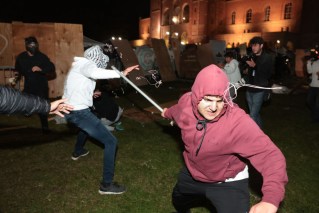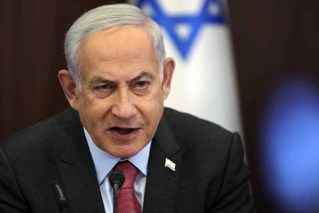Kim Jong-un’s motives: What is he playing at?

Celebrating the launch of an earlier missile, Kim Jong Un embraces a favourite general. Photo: Getty
What does Kim Jong-un want?
That remains far harder to answer than the technical questions about Mr Kim’s bombs and the reach of his missiles that have preoccupied American, Japanese and South Korean intelligence officials for years.
After North Korea’s underground test on Sunday, more is now known about the power of his nuclear arsenal, even if mystery remains about the veracity of the North’s claim that it detonated a hydrogen bomb.
Yet six years after Mr Kim took power and began executing those who challenged his rule – sometimes with an antiaircraft gun – there is no issue that confounds analysts more than the motives of a 33-year-old dictator whose every move seems one part canny strategy, one part self-preservation, and one part nuclear narcissism.
The conventional wisdom has always been that Mr Kim, like his father and grandfather before him, is mostly motivated by a deep desire to preserve the family business – a small country that is an improbable, walled-off survivor of Cold War.
But inside the Trump administration, many have begun to question the long-held assumption that his nuclear build-up is essentially defensive, an effort to keep the United States and its allies from finding the right moment to try to overthrow him.
Mr Kim’s real goal may be blackmail, they argue – the sort that would be possible as soon as North Korea can put Los Angeles or Chicago or New York at risk.
It may be splitting the United States away from two allies – Japan and South Korea – who wonder whether the United States would really protect them, and half-expect President Donald Trump to make good on his campaign threat that he might pull American troops from the Pacific.
Or it may be about making Mr Kim a power broker, a man Mr Trump and Xi Jinping – leaders of the two superpowers Mr Kim is fixated on – must treat as an equal.
Maybe it is about all three.
Few people outside of North Korea have met Mr Kim, including his supposed protectors, the Chinese.
Defectors periodically appear in London or Seoul, and offer insights, but few are true insiders. Documents revealed by Edward Snowden show that American intelligence agencies broke into the computer systems of the Reconnaissance General Bureau – the North Korean CIA – but they learned more about operations than intentions.
No one knows what North Korea wants
“Anybody who tells you what North Korea wants is lying, or they’re guessing,” said Jon Wolfsthal, a scholar in the nuclear policy program at the Carnegie Endowment for International Peace and former senior director for arms control and nonproliferation in the National Security Council under President Barack Obama.
“We don’t know what Kim Jong-un has for breakfast, so how can we know what his real end game is? We just don’t have great intelligence into his personal thinking.”
In public statements, the country has made clear that it wants to be accepted as a full member of the international community and that it wants to develop its economy alongside its nuclear program. It has also maintained as a longtime goal the desire to reunify with South Korea – on the North’s terms.
Although Mr Kim makes repeated bellicose threats against the United States and South Korea, such statements are always conditioned on the Americans or South Koreans continuing their “hostile policy” against the North.
But none of that explains the pace at which Mr Kim – more technically savvy and more brutal than his father – has raced in the past year to develop an arsenal of nuclear weapons that can hit multiple targets in the continental United States.
He has nearly achieved that goal.

Kim Jong-un unveiled what his state media says is a nuclear warhead capable of striking the US mainland. Photo: KNCA
The most commonly heard explanation is that Mr Kim believes that once he can hit Los Angeles, or maybe New York and Washington, the United States would never risk doing to him what it helped do to Muammar el-Gaddafi, the now-deceased Libyan leader.
Gaddafi gave up all the elements of his nascent nuclear weapons program in 2003, in return for promises of economic integration with the West. That never fully materialised. And as soon as there was an uprising against him, the United States, European allies and some Arab states bombed him. He was found by rebel forces and executed.
But perhaps more than a self-preservation strategy is at work here. Mr Kim, some of Mr Trump’s advisers and outside experts believe, thinks he may be able to force the United States to withdraw sanctions and pull back its troops from South Korea, where they are a perennial irritant to Pyongyang.
Where analysts diverge is what he might do if the United States really did withdraw some or all of its forces, as Mr Trump’s former chief strategist, Stephen Bannon, suggested that Washington consider doing.
One fear is that it could use its nuclear arsenal as a shield for a military invasion of South Korea in an attempt to reunify the peninsula by force.
The worry, say those who fear the North is considering that option, is that its ability to strike the United States with nuclear missiles could undermine Americans’ ability to guarantee that it would protect South Korea, as well as Japan, from attack.
“If the Americans face a choice between San Francisco and Seoul, they will choose San Francisco,” said Andrei Lankov, a North Korea expert at Kookmin University in Seoul.
Based on that calculation, Mr Lankov said, North Korea “can provoke a conflict in South Korea and then they can just basically put an ultimatum to the United States telling the Americans that if they get involved, they are going to basically get a North Korean retaliation strike”.
Such a conflict would be catastrophic for Asia, and could lead to the loss of hundreds of thousands of lives. But it would also undercut every assurance the United States has made to other allies, from NATO to New Zealand, about coming to their defense.
‘Low, but real’ possibility North wants reunification
The probability that the North intends to use force to reunify the peninsula, Mr Lankov said, is “low, but real”.
It is also one of the regime’s stated goals, though one that — in the absence of nuclear weapons — it has never had a realistic hope of achieving. Many believe it is a fantasy, with or without a nuclear arsenal.
“North Korea does not have the power to carry out an all-out war that could last a long time for unification by force,” said Cho Han-bum, a senior researcher at the Korea Institute for National Unification, a South Korean government-funded think tank.
“There is no way North Korea, while suffering from food shortages, can liberate South Koreans by force.”
Mr Kim, Mr Cho said, “has no intention of putting his words into action”.
He may well be right, but given the miserable track record of anticipating Mr Kim’s intentions, neither American nor South Korean leaders seem eager to make that assumption. (One senior Trump administration official noted that in 1950, everyone assumed the North was too weak to invade the South, and were wrong.)
“It is important to take Pyongyang’s threat seriously,” said Mo Jongryn, dean of the graduate school of international studies at Yonsei University in Seoul.
There is another, less dramatic interpretation of Mr Kim’s intentions. The combination of his developing nuclear program and his increasingly impressive cyberprogram may allow the North to effectively get away with smaller provocations without fear of military retaliation.
North Korea has not paid a price for bad behaviour
Mr Kim paid very little price for the cyberattack that took out 70 per cent of Sony Pictures Entertainment’s computer systems three years ago.
There was no retaliation for its attacks on South Korean banks and media companies; its suspected theft of money from the Bangladesh central bank; or its role in a recent attack that hit Britain’s hospitals with ransomware demands. It might try to expand its cyberattacks for profit, or blackmail countries for economic aid.
Another possibility is that the regime will use its nuclear weapons to gain the upper hand in any future negotiations with the United States and its allies.
In the past, negotiators assumed North Korea might be prepared to trade away its nuclear program in exchange for economic support or a peace treaty with the United States, which would mean a final settlement of the seven-decade old conflict on the peninsula. (Under the United Nations armistice that suspended the Korean War in 1953, North Korea is still technically at war with South Korea, and its allies.)
But now the hope that sanctions will lead North Korea to give up an arsenal in which it has invested so heavily seems almost a fantasy. Instead, there is talk of whether, as an interim step, Mr Kim might consider a freeze of its programs at their current level.
If so, the huge build-up of the past few years may have an easy explanation: Before negotiating a freeze, Mr Kim may want a nuclear capability too big to dismantle. In short, he wants to be treated like Pakistan, or India, which have made clear they will never trade away their nuclear arsenals. By and large, the world has stopped demanding that they do so.
Domestic politics are also at work. Keeping nuclear weapons is also how the Kim regime can best engender fear and loyalty in the country’s populace.
“In order to justify what they’ve been doing all these years, they need an enemy of the United States to continue to exist,” said Suzanne DiMaggio, a director and senior fellow at the New America research group who has been involved in unofficial talks with North Korea.
“Once that enemy is gone, then they don’t have the rationale any longer to keep this society in complete isolation.”
That is not to say that the North Koreans don’t have a list of wants if and when they are offered a seat at the negotiating table.
The North has repeatedly called for the suspension of annual war games conducted by the United States and South Korea and an eventual withdrawal of American troops from the peninsula. It is likely to want a guarantee that the United States will never again station tactical nuclear weapons in South Korea. It will surely want sanctions lifted, and some economic aid, as well as diplomatic recognition.
Critics of past negotiations with North Korea say it will never be satisfied. “It’s just this endless slippery slope of demands,” said Bruce Klingner, a Korean and Japanese specialist at the Heritage Foundation in Washington.
Respect us or we’ll cause trouble
Some analysts say that what North Korea most wants is respect.
“There is a certain universality of wanting to be recognized and respected,” said Cameron Munter, former United States ambassador to Pakistan and now president of the EastWest Institute.
“And because Americans take this for granted, they don’t see just how deeply motivating that search for respect can be.”
But granting that wish can be difficult for politicians who do not want to appear to be bowing to a dictator.
The farthest Mr Trump went recently was to say at a rally in Phoenix last month that he respected the fact that Kim Jong-un “is starting to respect us”.
If that was ever true, it didn’t last long.
–The New York Times








